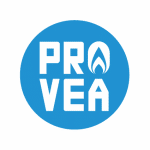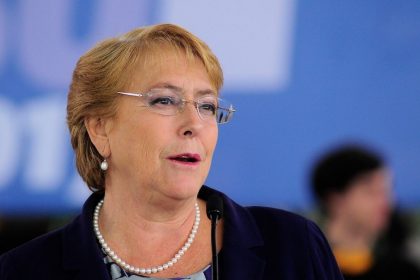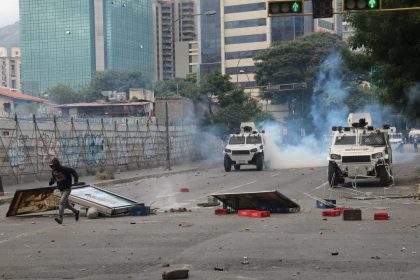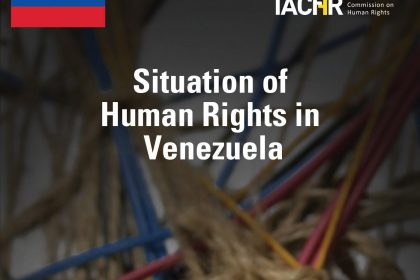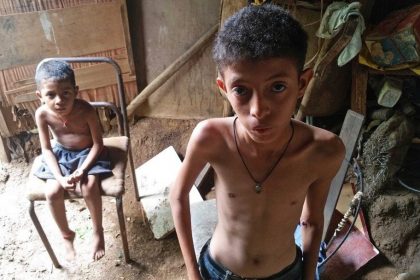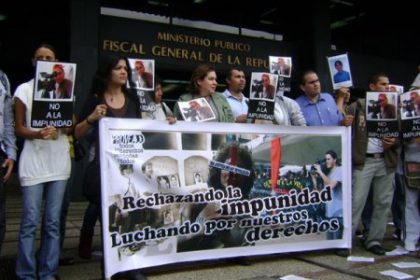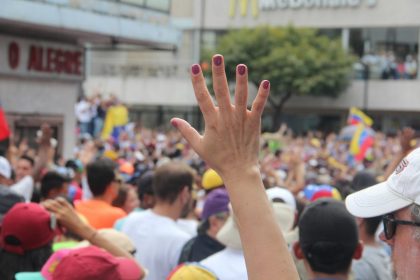On 19 April, Nicolás Maduro entered his fifth year in front of the national judiciary. Maduro started his presidency arguing he would be the first “blue-collar” president in Venezuelan history. Like Hugo Chavez, he criticised the neoliberal economic model and condemned the role that the financial transnational companies and corporations have had in the subjugation of the developing and poor countries and populations.
Maduro, who became a Dictator, promised the construction of an economic model based in justice and equality. Lie after lie, Nicolás Maduro became into what Provea had warned from the very first day: an anti-blue-collar president. His dictatorship does not only openly violate the rights to the personal freedom; to life and personal integrity, committing murders, tortures and arbitrary detentions through citizen security operations as the OLP (acronym in Spanish) or in the context of the demonstrations, but it also imposes an economic model that generates further exclusion and impoverishment, ignoring his obligations in regard to the guaranty of the population’s Economic, Social and Cultural Rights.
In 5 years, Maduro extinguished -through the irresponsible management of the public finances and the generalised repression- the possibility of establishing a favorable environment against poverty and of uplifting the values of human rights and democracy.
There are no human rights without democracy, and while the citizens are subjected to severe restrictions to exercise their rights to information, expression, association, syndication, demonstration, among others; the economic, social and cultural rights are at risk and its guaranty is uncertain.
Maduro, a poverty factory
In January this year, during the annual presentation of his Report and Account before the unconstitutional constituent national assembly, the president of the Republic Nicolás Maduro claimed that Venezuela’s poverty was 18.1%, while extreme poverty was 4.4% in 2017’s closure, according to the head of state.
The president Nicolás Maduro lied to the country once again in topics related to poverty. In January 2014, Maduro had also lied to the country in this respect, when he said in national broadcast that the figures of extreme poverty had gone down to 5.5%, when they had actually gone up to 8.8%, which meant that 189,086 homes started to live in extreme poverty during the period January-December 2013.
In July 2015, the National Institute of Statistics (INE, acronym in Spanish) published its last official public report on homes in situation of income poverty during the first semester 2015, in which it admitted a new increase in Venezuela’s poverty figures that, according to the official data, showed 33.1% of poor homes on the first semester 2015.
By then, 2,434,035 Venezuelan homes were in situation of poverty, according to the information provided by INE, whose report was published a year and a half late. According to the official data, from January 2013 to June 2015, 950,771 homes entered into the description of income poverty. Although INE deleted the number of people in situation of poverty from its website, this figure indicated that an average of 12,170,175 Venezuelans where in condition of poverty by the first semester of 2015, which would cover 39.7% of the population. In average, 4,791,917 Venezuelans became poor in the first two and a half years of Nicolás Maduro’s administration. A true poverty factory.
In the first two and a half years of Nicolás Maduro’s management, the percentage of homes in condition of poverty had elevated from 21.2% in January 2013 to 33.1% in June 2015, and increase of 11.9%. Whilst the number of poor people was 64.94%, as it grew from 7,378,258 people in situation of poverty by December 2012 to an average of 12,170,175 poor people in June 2015.
On February 2018, 87% of Venezuelan homes were in situation of poverty, according to the results published by Survey on Living Conditions (ENCOVI, acronym in Spanish) 2017, a project developed since 2014 by a high level multi-disciplinary team from the three most important universities in the country: Universidad Simón Bolívar (USB, acronym in Spanish), Universidad Central de Venezuela (UCV, acronym in Spanish) and Universidad Católica Andrés Bello (UCAB). According to the research, the hyperinflationary context has led the income poverty to be part of 87% of Venezuelan homes: “all Venezuelan homes are below a line of unattainable poverty.” The report indicated that as a result of the non-indexation of salaries, “the inflationary scale is impoverishing everyone, so this measurement method does not segment population. That is not part of the phenomenon.”
In the survey, it is highlighted that 61.7% of homes are currently in condition of poverty, an indicator that grew from 23.6% in 2014, going through 49.9% in 2015, to 51.5% in 2016; an accelerated growth in just 4 years, mainly due to the fall of the gross domestic product of the economic crisis. The first ENCOVI, held in 2014, had registered by that period, the proportion of general income poverty of 48.4% and 51.6% of homes were declared non-poor by then. Four years later, the study shows that these indicators have reversed, since the general poverty is 87% and the figure of non-poor homes is barely 13%.
Nicolás Maduro’s dictatorship destroyed the productive capacities of the country, generating more dependence on the imports and favoring a big corruption network associated to the alimentary industry. In 2016 and 2017, the control of the national alimentary system as strategy and State policy was consolidated. All alimentary functions of the country are run by the military. In 2017, the annual inflation that closed in 2,616%, according to the National Assembly, destroyed the purchasing power of the workers and ended the alimentary independence of the poorest families, so 80% of the population is incapable of satisfying their minimum alimentary needs. Hunger pushed people to the garbage to look for food, while the damage in the nutritional state of kids and adults is evident.
Facing this situation, the dictatorship has repeatedly denied the existence of a complex humanitarian emergency and of a deep alimentary and health crisis, thus shutting the possibilities to activate the international cooperation mechanisms to aid solve the grave crisis and the severe nutritional damage to the population in greater vulnerability. On the contrary, the scarce measures adopted by the Executive in regard to food have been directed to further establish mechanisms of the population’s social control, such as the exclusionary and unconstitutional Local Committees of Supply and Production (CLAP, acronym in Spanish) and the Homeland ID (Carnet de la Patria in Spanish), which condition access to food, housing, medicine and other rights to the linkage with the official party or the structures linked to the Bolivarian political project.
The dictatorship submits the poor to a permanent condition of angst and uncertainty. Venezuela has entered a period of hyperinflation and accelerated fall of the economy that will further increase the levels of poverty, food and medicine scarcity and generalised deterioration of the public services. The actions and omissions of Nicolas Maduro’s government before the crisis have driven the country to the brink in social matters.
The erosion of the Venezuelans’ social rights and the despair of millions of families fuel a social outburst whose consequences for human rights would be unpredictable, due to the clear and open encouragement to the commission of abuses aided by government’s spokespeople to the agents of the public forces and the systematic and generalised pattern of violations of human rights against the population exerted by the State’s security forces in the latest cycle of protests.
Provea Press
